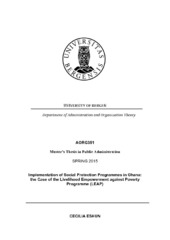| dc.description.abstract | Social protection up the development agenda has been consistently characterised by social transfer programmes mostly in the form of conditional cash transfers (CCT) especially in developing countries. However implementation of such programmes has not been quite impressive. Ghana started the implementation of LEAP in 2008 as a pilot programme. The LEAP aims at transferring conditional and unconditional cash transfers to the extremely poorest households in the country. The rationale is to empower the poor and vulnerable categories in the country so as to boost economic development. The study assessed the implementation of the LEAP in two different parts of the country (Ghana), North (Savelugu District) and South (Ga South Municipality). The main aim was to know the factors that contributed to any differences or similarities that existed as far as the extent of effective implementation of LEAP in these two parts of the country is concerned. Therefore indicators such as effective targeting of beneficiaries, regular and consistent payment of grants to beneficiaries, effectively linking beneficiaries to complementary services like NHIS etc were assessed. Based on these assessment criteria, factors such as politics, resource capacity (financial & Human), administrative structure and target group behaviours were used in analysing the differences and similarities that contributed to the level of effectiveness in the implementation of LEAP. Using a qualitative research method, data (Interviews, Focus Group Discussions, observations and documents) were compiled and analysed and with Winters Integrating Model, Meter and Horn Model of Implementation and Bo Rothstein Implementation Model as theoretical frameworks, the study concluded that, even though other factors may had affected the differences that existed in the extent of effective implementation of the LEAP, level political interferences, human resource and the target group behaviour are the three most important factors that had contributed to the variations that existed between Savelugu District (North) and Ga South Municipality (South.) | en_US |
